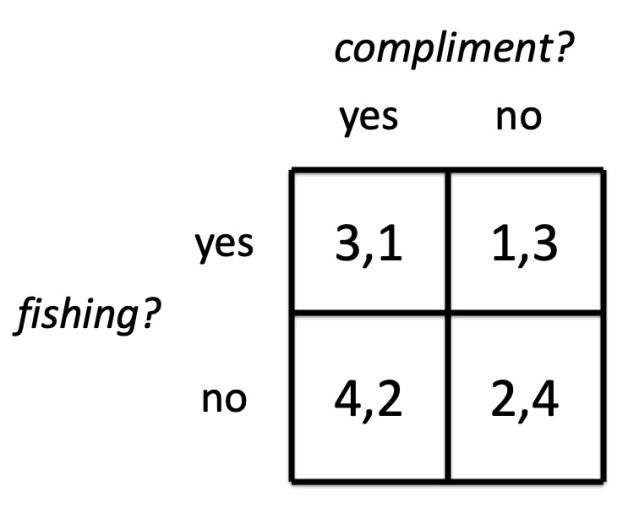Social Life
Why People Fish for Compliments
This is a social dynamic that can be both artful and annoying.
Updated May 30, 2024 Reviewed by Gary Drevitch
Key points
- Compliment fishing is a social game.
- Compliment fishers reveal their insecurity.
- Give praise sincerely, but do not ask for it.
My big fish must be somewhere. – Hemingway
When fishing, best use the harpoon, not the net. – Hoca Camide
I remember vividly when I heard the phrase fishing for compliments for the first time. My Tante (Aunt) Hanna had returned to Germany after spending two years in the United States. For me, this was the first encounter with a person who had become bilingual. In conversation – and I do not remember what I said to provoke this response – she said, “You are fishing for compliments.” I knew right away what the phrase meant and that I had been reprimanded.
Fishing for compliments is common, and its effectiveness is debatable. I could not find any data; the matter seems to be understudied. There is some interesting work on humblebragging, which is one fishing technique (Sezer et al. 2018; see also Krueger, 2022), but that’s about it. The website wikihow has an excellent overview, which is mostly based on clinical experience and folk psychology (Campos & Carreau, 2024). Although the fisher’s insecurity is not the only factor contributing to this phenomenon, it is a major one. And although the target of the fishing need not be annoyed by this tactic, they often are. But if mildly unpleasant affective states come into play, why does fishing occur at all? I will attempt in this post to frame fishing as a social game, one in which the interests of the fisher and the interests of the target are not well aligned.
Fishing is a manipulative and risky tactic. A fisher of great social intelligence nudges the target so subtly that the target complies with the nudge without realizing that they have been played. To find examples, we would have to ask fishers, but their reports will not be fully reliable because a target of goodwill and high social intelligence may pretend to not notice the nudge. I now wonder if my Tante Hanna was short on goodwill or social intelligence; but I choose to believe that she had goodwill and wanted to teach me a concept. We also have to allow room for the possibility that an entire encounter runs its course without conscious awareness on either side. Pedro moans how busy he is and Paulo dutifully notes how much Pedro accomplishes, and everyone is happy and feels important.
Now let us focus on a fisher who has a choice between throwing out the bait in visible fashion and doing nothing. The target, in turn, has a choice between taking the bait (by complimenting the fisher) and doing nothing. The game is played sequentially. The fisher moves first (doing nothing can be construed as a move in this type of analysis) and the target moves second (again, doing nothing is a move). The fisher’s main interest is to receive a compliment because it is a gain; the target’s main interest is to do nothing because giving is a cost. The fisher’s secondary interest is to not have to fish, because it is work. The target’s secondary interest is not to be fished, because it is annoying.

The payoff matrix above shows the game. Higher numbers indicate greater preferences, and the numbers to the left and to the right of the comma are respectively the fisher’s and the target's preferences. We can clearly perceive the fisher’s dilemma: Not fishing is the dominant strategy; no matter what the target does, the fisher is better off not fishing. Yet, this means that if the fisher doesn’t fish, the result is mutual inaction, which is an equilibrium state with the second lowest of four possible outcomes for the fisher. The fisher really would love to be praised without having to ask for it, but is happy to ask for it if that means the target will respond. Of course, the target’s preference ranking says that the target will not respond. Remember, however, that the fisher is probably both a bit insecure and a bit narcissistic. They may have a distorted understanding of the game, thinking they can manipulate the target with expert subtlety (narcissism) or that they are so needy that they they’ll throw out the bait against the odds (insecurity).
What should we do instead? In a Zen world or a world of metaphysical determinism, asking for and giving praise are both unknown (Krueger & Grüning, in press). But ordinary people do not live in that kind of world. The kind of humility that seems within reach is to practice giving praise sparingly but wholeheartedly, and to never ask for it.
Afternote. A reader questioned the assumption that giving a compliment is a cost. In response, we may - a bit tautologically - observe that if there were no cost, we'd see more compliments in this world. Also, from the fisher's point of view, compliments better be costly to the target, lest they'd mean little.
Facebook image: Prostock-studio/Shutterstock
References
Campos, F., & Carreau, G. (2024). What it means to fish for compliments (& why people do it). Wikihow (accessed May 30, 2024).
Krueger, J. I. (2022). Why do we brag? Psychology Today.
Krueger, J. I., & Grüning, D. J. (in press). The unceremonious death of free will. Review of ‘Determined: A science of life without free will’ by Robert M. Sapolsky. American Journal of Psychology. https://osf.io/preprints/psyarxiv/5aytj
Sezer, O., Gino, F., & Norton, M. I. (2018). Humblebragging: A distinct—and ineffective—self-presentation strategy. Journal of Personality and Social Psychology, 114, 52–74. https://doi.org/10.1037/pspi0000108


